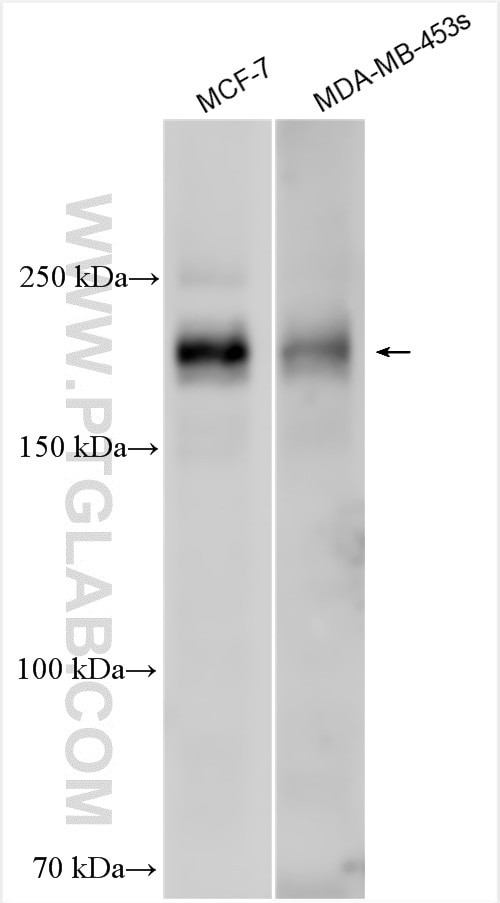Tested Applications
| Positive WB detected in | MCF-7 cells, MDA-MB-453s cells |
Recommended dilution
| Application | Dilution |
|---|---|
| Western Blot (WB) | WB : 1:500-1:2000 |
| It is recommended that this reagent should be titrated in each testing system to obtain optimal results. | |
| Sample-dependent, Check data in validation data gallery. | |
Product Information
30452-1-AP targets ERBB3 in WB, ELISA applications and shows reactivity with human samples.
| Tested Reactivity | human |
| Host / Isotype | Rabbit / IgG |
| Class | Polyclonal |
| Type | Antibody |
| Immunogen |
CatNo: Ag30713 Product name: Recombinant human ERBB3 protein Source: e coli.-derived, PET28a Tag: 6*His Domain: 1037-1342 aa of BC082992 Sequence: TLNRPRGSQSLLSPSSGYMPMNQGNLGESCQESAVSGSSERCPRPVSLHPMPRGCLASESSEGHVTGSEAELQEKVSMCRSRSRSRSPRPRGDSAYHSQRHSLLTPVTPLSPPGLEEEDVNGYVMPDTHLKGTPSSREGTLSSVGLSSVLGTEEEDEDEEYEYMNRRRRHSPPHPPRPSSLEELGYEYMDVGSDLSASLGSTQSCPLHPVPIMPTAGTTPDEDYEYMNRQRDGGGPGGDYAAMGACPASEQGYEEMRAFQGPGHQAPHVHYARLKTLRSLEATDSAFDNPDYWHSRLFPKANAQRT Predict reactive species |
| Full Name | v-erb-b2 erythroblastic leukemia viral oncogene homolog 3 (avian) |
| Observed Molecular Weight | 200 kDa |
| GenBank Accession Number | BC082992 |
| Gene Symbol | ERBB3 |
| Gene ID (NCBI) | 2065 |
| RRID | AB_3086320 |
| Conjugate | Unconjugated |
| Form | Liquid |
| Purification Method | Antigen affinity purification |
| UNIPROT ID | P21860 |
| Storage Buffer | PBS with 0.02% sodium azide and 50% glycerol, pH 7.3. |
| Storage Conditions | Store at -20°C. Stable for one year after shipment. Aliquoting is unnecessary for -20oC storage. 20ul sizes contain 0.1% BSA. |
Background Information
V-erb-b2 erythroblastic leukemia viral oncogene homolog 3 (ErbB-3, HER3) is a member of the EGF receptor tyrosine kinase family including EGFR (HER1), Neu (ErbB-2, HER2), ErbB-3 (HER3), and ErbB-4 (HER4) that are frequently overexpressed in a variety of carcinomas. These family members form either homodimers or heterodimers upon ligand binding to mediate cell growth. ErbB-3 binds and is activated by neuregulins and NTAK. It forms a heterodimer with each of the other ErbB receptors. ErbB-3 is predominantly expressed in epithelial tissues and the brain and is overexpressed in a subset of human mammary tumors.
Protocols
| Product Specific Protocols | |
|---|---|
| WB protocol for ERBB3 antibody 30452-1-AP | Download protocol |
| Standard Protocols | |
|---|---|
| Click here to view our Standard Protocols |




